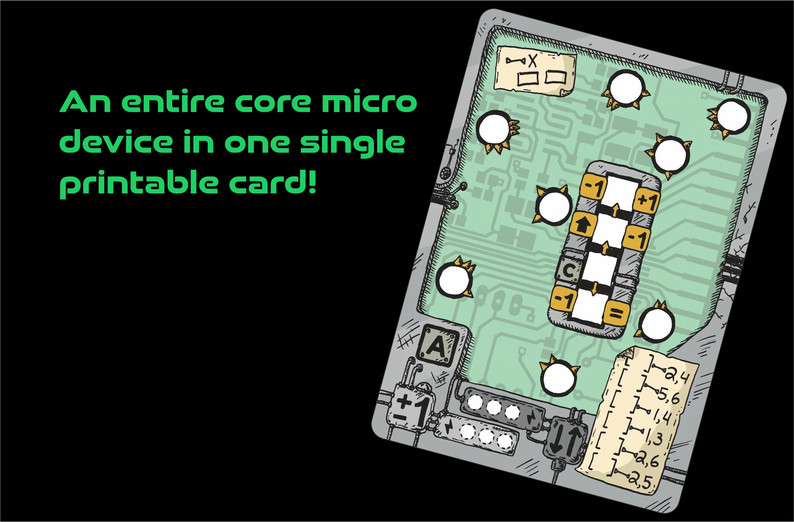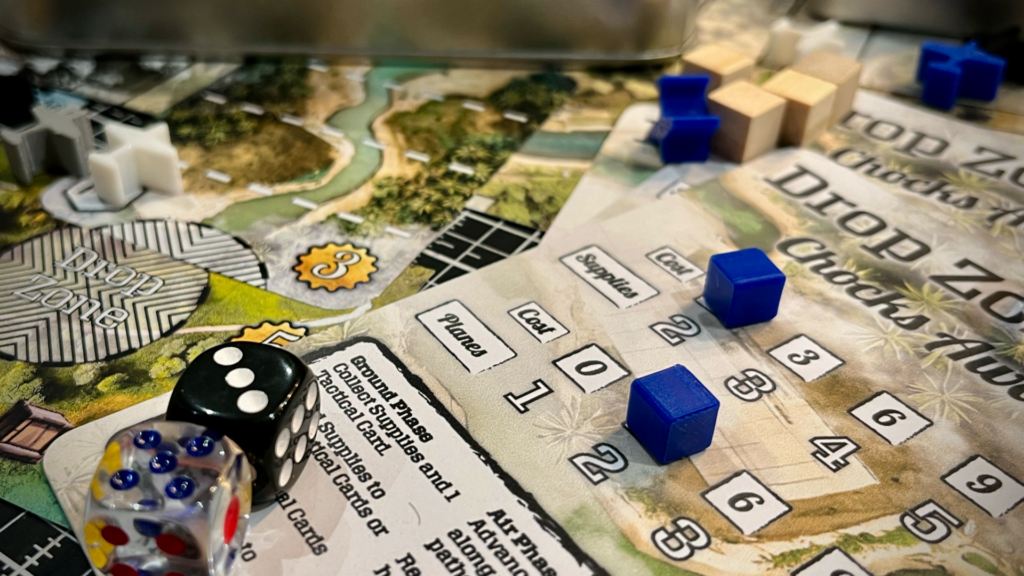The more I blog, the more interesting stories and people I find. Today I catch up with Rômulo from Reaver Workshop who is looking a games design a little different. His games are super small, sometime the size of just a playing card. His publishing model is interesting too, so read on and make sure to check out his work here.
Joe: Heya – thanks for joining me on the blog. Can you start by telling me a little bit about who you are and why you make games?
Rômulo: Greetings Joe! First of all, thanks for your contact. My name is Rômulo Machado and I’m from Brazil. I still don’t see myself as a game designer/creator yet; I think I’m more in an initial phase of experimenting, learning, and exploring game creation. Why? Because I fell in love when I discovered the existence of print and play games less than a year ago. I’ve assembled almost 100 games so far and became obsessed with the inspiration these games brought me, prompting me to create my own games.
I have a full-time job as a graphic designer, and in my free time, I’m an artist and a lover of some video games (my brother works with programming in a game company). Creating small PnP games seemed like a great way to combine and express something good using all my knowledge and abilities. That’s when Reaver Workshop was born a few months ago.
I fell in love when I discovered the existence of print and play games
Joe: Someone recently told me that if you make games, then you are a board game designer, no matter if you’ve been making games for decades, years or months. I look at your work, and you’re 100% a board game designer!
Your recent game Micromend popped up on my Instagram feed recently and I totally fell in love with the concept and then the game itself. I wonder if we could explore how you came to the idea – what’s the history of the game?
Rômulo: That’s funny because I’m not a real fan of board games; indeed, I’ve played only a few and don’t own any. But that was the reason behind my enchantment with small print and play games. I think it’s brilliant what some people create with only a few cards and components, making it available for you to craft and assemble at home. To me, print and play is a niche in the board games world that means something more than just playing board games.

I got very inspired by games such as One Card Dungeon, One Card Maze, and the roll and write Lantern. I think these are the three main games that contributed to the creation of Micromend. Since my first game, Trimod, had a medieval fantasy theme, I tried to make something different in the sci-fi style. I sketched some random ideas on a small piece of paper, and then the ideas just sprouted. “Hmm, I could make a game on one card like those I like, with some mechanics inspired by Lantern… Oh! What if the card itself were a futuristic device and the objective was to repair it! Done!”
Then the first mechanics were born, and I noticed on BGG (BoardGameGeek) there was a contest happening, which was the perfect chance to improve my creation and learn from experienced people there. I entered the game in the contest, and after it ended, I made the final touches and released it on my itch.io page for Reaver Workshop. It’s my second game.
Joe: You’re right; creating games in that small, restrictive form factor is quite an incredible skill. Do you have any thoughts on how you manage it? I feel like the restrictions would make me really struggle. How does that space bring you creativity, rather than limitations?
Rômulo: In fact, it is the limitation that I impose on myself that brings the creative power. The challenge of dealing with this limitation is what makes the creative process fun. My first experience with game creation involved creating a digital adventure game with my brother (the programmer) that should fit on a floppy disk, having only 1.44 megabytes of space! We made it, with graphics, soundtracks, and everything. It was quite fun. Another factor that motivates me to create and enjoy small games is time. I have two jobs—a full-time one and another to increase my income—so I don’t have time (and sometimes lack energy) to get involved in large creations, unless it would provide me a living. I also don’t have time to play large games or buy them, due to economic issues in my country, Brazil. So this world of small print and play games really suited my lifestyle, and that’s what I want to provide with Reaver Workshop.
The challenge of dealing with this limitation is what makes the creative process fun.
But getting back to the issue of limitation and creativity, I think it’s the struggle I face when I have to deal with the problems that limitation brings which makes me grow my skills, reflected by what I appreciate in others’ works. Limitation isn’t a problem; it creates problems that stimulate creativity in how to solve them in the best ways I can. Crafting the final product becomes a reward itself, almost as if creating a game with self-imposed limitations is like playing a “game of creation”.
Joe: That’s super interesting—I’m inspired now to experiment a little with limited forms and see what creativity it produces.
I’d like to ask you about your business model—you’re using itch.io and a pay-what-you-want model. Can you tell me a bit about that choice of self-publishing route?
Rômulo: As I said before, I don’t consider myself yet a game designer, much less a game publisher. Reaver Workshop is just a label to group all my works and keep them organised. Since I also mentioned that I cannot afford expensive board games, I think it is fair to release my games in a “pay what you want” format because I expect to get back at least some consideration for the time and care I dedicate to all my works. Even though I am not so experienced, I am sure you will notice a lot of care in all aspects of my games, and for that, I expect at least some financial contribution from those who appreciate them. Itch.io offers a complete, easy-to-use, and shareable platform with an audience for that. Up to now, I think it’s the best way to showcase my work. Since I’m just starting, I have a lot to learn. Maybe in the future, if I gain some popularity in BGG or the overall PnP community, I could consider releasing a commercial product or start a funding project.

Joe: I see a lot of games, and yours are up there in terms of quality and production. Do you find many people pay for your designs using the pay-what-you-want model?
Rômulo: Not as much as I would like and think it deserves, but yes, a few people do pay, and that makes me happy with these initial experiences (I think only between 5% and 8% of all the people who download pay for them). When I launched my first game, Trimod, I thought no one would like it, much less pay for it, but it actually had a nice response. Unlike the second game, Micromend, which didn’t have a great reception and financial return.
Joe: Do you have plans for this current business model? Do you think you’ll continue with itch.io and pay-what-you-want, or might you explore other publishing routes in the future?
Rômulo: I still have some other small projects to be released this year, and for those, I will maintain the same model. But after I release all I have in mind, I’ll prepare for another phase. Maybe I’ll focus on a more detailed work, perhaps even hire an artist or collaborate with other game and art creators. For that, I’ll surely change things, maybe start a crowdfunding, Kickstarter, or something like that, for a totally paid product with physical release and paid digital files for PnP. Even the smallest work demands a lot of time and dedication, so it would be unfair to myself if I keep everything for free.

Joe: This is such a useful perspective, Rômulo, and yes, you really should be paid for your art! How about finishing off by telling us a bit about one of your games that people can check out!
Rômulo: You can check my work on my itch.io page here: https://reaver-workshop.itch.io/. I have two games released, Trimod and Micromend, and have two more to be released this year (I think…), Selfantasy and Rpage. All of them are minimalistic, small, simple, easy, and fast to play. Each one of them is a special experience for me and has a special meaning in this first phase of Reaver Workshop. But I’ll talk about my first game, Trimod, which is the most special at the moment.
Trimod is a simple push-your-luck small game played with only one die and three cards, following an RPG storytelling style. You just roll the die, see what happens, then roll the die again to beat a challenge. Each set of three cards makes a complete adventure. For some people, this might be very boring and the game has lots of flaws since it is my first game, but I think it has a special touch that encapsulates all the ideas and plans I have for Reaver Workshop, which is to make small minimalistic games. Unfortunately, for this game, I used AI art. However, as an artist, I’m currently creating some very cool hand-drawn artworks for my next games. Since I wanted to bring full colour and detailed artworks to this game, I decided to go with AI. In the future, I plan to enlist artists to create the artwork for each scenario of three cards. Dreaming big, I think this game has the potential to become a nice trading card game, not in the battle style, but just collectible cards with good artwork from RPG and Fantasy artists around the world, with a nice and quick gameplay.
Thank you very much for this invitation, all the best to you!
Hey team, two things for you to do:
- Follow Rômulo on Instagram here.
- Check out one of his games from here.


